Align Sales and Marketing Teams
- Home
- Align Sales and Marketing Teams
(and create a revenue engine)
This article is a summary of the presentation talk by Dan Tyre from HubSpot at the HubSpot User Group Meeting in March 2018. The full transcript of the talk and the video presentation can be seen by following this link.
Note: Use this link to download this guide as an eBook to keep and reference.
There was an implicit state of things in running a business in the past: marketing and sales departments have always been very different in their functionality, as long as marketing and salespeople have always had a diverse mentality.
Now things are changed, and if you want to see your business growth, you must seriously consider implementing one crucial strategy: align sales and marketing teams.
How to do it? This eBook is going to explain you the entire process, step by step.
In a recent HubSpot User Group Meeting (March 2018), Dan Tyre from HubSpot explained some proven tricks and tactics that his company used to improve selling and increase its turnover exponentially.
Why you must modify procedures that have been working for years? Because the world is different and the future is now.
There is a huge change in the buyer’s behaviour and people don’t trust anymore in representatives and marketing professionals. Today we can no more talk about sales or marketing, we have to talk about smarketing: it's all mixed together.
You can do this alignment thanks to the Inbound methodology: it is a very human approach of taking total strangers - people that have never heard of you and your company - and converting them into table-pounding advocates. If you do not want your business to become outdated, keep on reading and discover how Inbound can help your turnover.
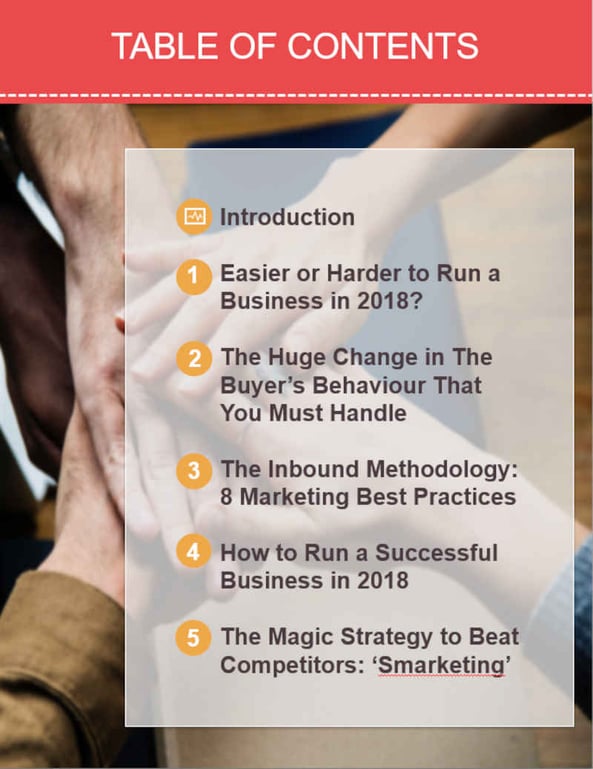
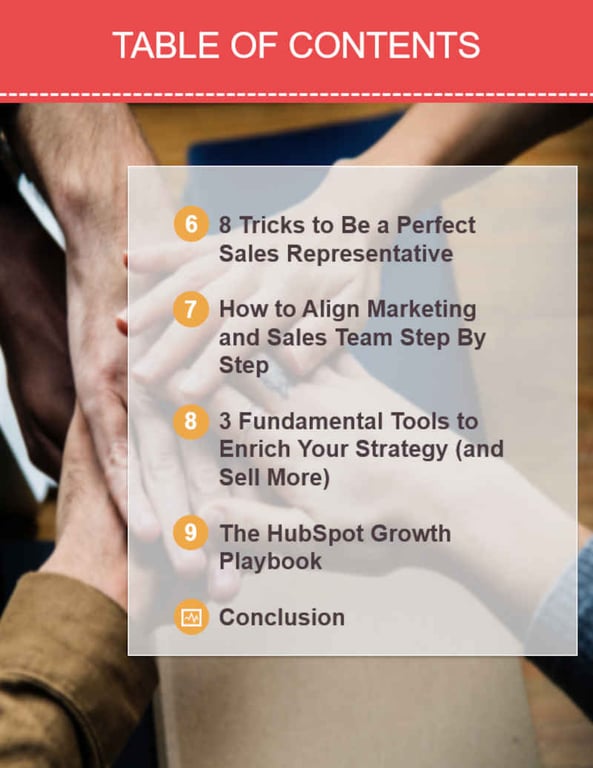
Easier or harder to run a business in 2018?
4 challenges to face today
If you look at all the technology and the facilities a businessman can handle nowadays, you may think that managing a society in 2018 should be a piece of cake: there are free apps to support you, a lot of information about the business world and Social Media with tons of potential customers to reach.
Bad news: it’s not like this. In fact, at the HubSpot User Group Meeting of March 2018 the audience said to Dan Tyre that their feelings are very different: running a business is getting harder and harder, ultimately for 4 reasons:
- 1. More choices.
It's because for everyone across the world is easier to start a business. People have more choice than ever before in each purchase field, but all those expositions make it harder for buyers to decide between products or services, and on the other hand for companies or professionals to sell. There is a lot of noise out there because everybody seems to sell something. A HubSpot research shows that just in 2016 a company had 6-8 competitors on average, today 20 competitors.

(Photo Credit: Anthony Martino on Unspla)
- 2. Short attention span.
Some researches show that the attention span of a UK consumer is 8 seconds. The one of a goldfish? 9 seconds.

(Photo Credit: zhengtao tang on Unsplash)
- 3. Customers have higher expectations.
If you don't meet those expectations, they'll just move onto the next product, service or society. They expect that you're going to know all about them, even if you have never talked to them before. They want you to answer quickly to their questions and needs.
In Dan Tyre’s point of view, it depends on the massive usage of mobile phones and applications: when you choose an app, you expect that it'll download immediately, even if you are on bad WiFi. You expect to open that app in the first 30 seconds, or you are moving onto the next one. This way of thinking permeated our entire life and impacts B2B and B2C as well.

(Photo Credit: Fancycrave from Pexels)
- 4. People don’t trust anymore in marketers and sales representatives.
A research shows that marketers and salespeople have no longer credibility in the EMEA area. Whereas the most trusted professionals are firefighters, teachers and doctors, only 1% of people trust in sales reps and 0% trust in marketers. And in 2018 you don't buy from people unless you trust them.
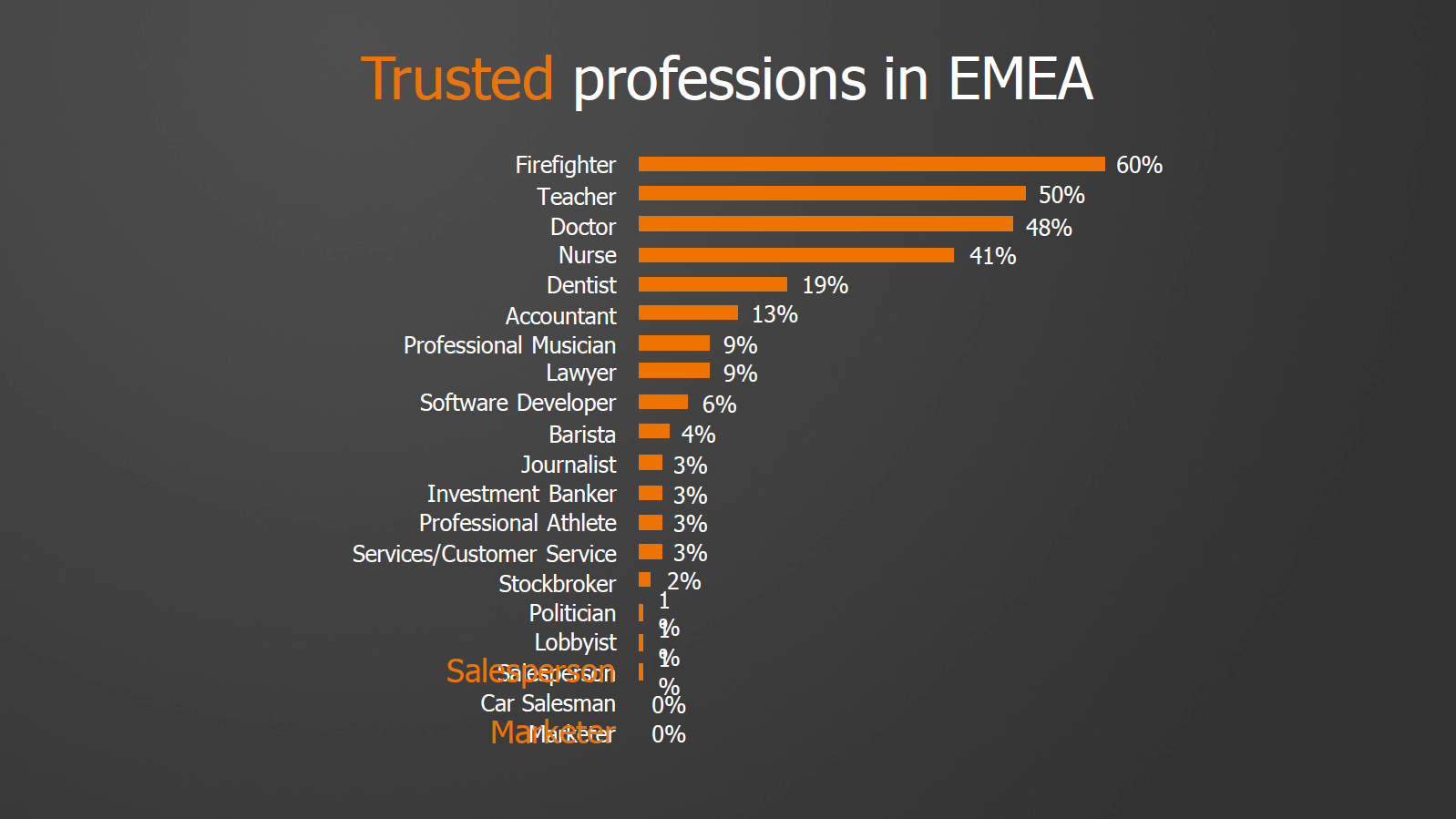
Admittedly, it’s easier than ever to start a new business, thanks to new technologies and free apps you can work with. So why don’t entrepreneurs feel different?
Because the challenge now is scaling the company.
Scaling the company requires a level of expertise and understanding of how to deal with all that changes, it requires what we call a growth strategy.
Resources
1. https://blog.whitehat-seo.co.uk/earn-your-potential-customers-trust-through-online-reputation-repair
The huge change in the buyer’s behaviour that you must handle
Nobody buys something in the same way we did 10 years ago. That’s a fundamental matter to understand if you want to sell your product or service in the future.
Years ago, we all use to go to a retail store, probably after reading magazines or going to a trade show to find out more information. Anyway, you couldn't buy anything unless you talk to the salesperson.
Back in those days, the salespeople had all the information about their product or service. Now reps are still important, but customers prefer to get the information by their selves.
Now people look for information online. Nowadays how could you ever buy something without googling it?

(Photo Credit: Pixabay)
The statistics from a HubSpot research say that 93% of people who are doing a B2C search or a B2B search start with an online search or social media query.
And this is happening for 3 reasons:
- Google, social media and reviews are free.
- You get all the information online.
- The extent of the information you get online is so massive that you can find anything you need to know
There is a substantial transformation in the buying process: people don’t need to talk to a salesperson. We call that self-service.
The statistics show that people don't really want to talk to a salesperson until they're 65% to 85% of the way through the sales process. In some industries, it's 99%, in some industries it's all the way to the end.
What does it mean? That in 2018 buyer has all the control of the buying process.
So why do you still need a salesperson?

(Photo Credit: Bruce Mars from Pexels)
Because the salesperson is just going to qualify people and close. Sales reps are still important, sales reps just morph. In the old days, they did 95% of the work, now 20-25%. But it's still important because they establish that relationship. And the relationship is crucial.
If you don't help leads at the beginning, you're not going to build trust with that customer. And if you don't build trust with that customer, you don't have a shot.
In 2018 the challenge of your sales organization is that sell is harder than it's ever been before. The basis of the strategies is the awareness that marketing and sales alignment means growth.
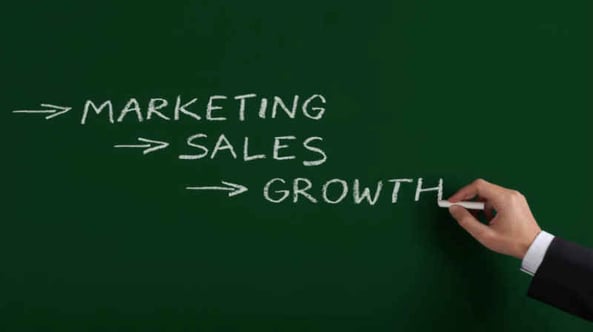
Resources
The inbound methodology: Smarketing best practices
The foundation of Inbound marketing is helping people. Inbound marketing works 8 times better than outbound, according to HubSpot research.
Other 2 good news about it:
- Inbound marketing is scalable, so you can obtain better results in less time.
- Currently, just 12% out of all the marketers in the UK are using the Inbound methodology.
So what? If you start putting it into practice right now, you’ll have a major advantage compared to your competitors.
“Inbound works 8 times better than Outbound”.
(Dan Tyre)
But why should you make an effort to help your leads? For 2 reasons:
1. Just because it's the good thing to do.
2. Because you want to earn in your business and in 2018, if you don’t help your prospects and clients, nobody will buy from you.
The Inbound methodology consists of 5 different steps.
1. Attracting strangers on your website and social media channels.
2. Converting these visitors into leads.
3. Turning them into customers (close stage).
4. Delighting your customers in order to make them promoters.
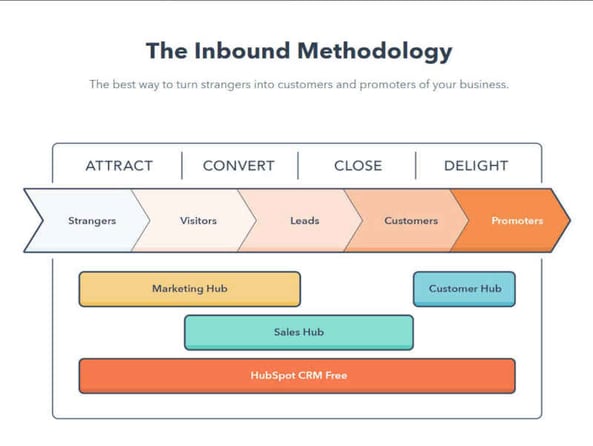
How to follow the procedure right? Here there are some best practices you should apply:
- 1. Blogging.
Is super easy, but if you don’t know which kind of content you should write about, HubSpot published an article called 74 Compelling Fill-in-the-Blank Blog Post Titles. Once you have the title, it's easy to post. And remember: if you're not producing content, if you are not optimising your website to bring the leads to the yard, there's no way to sell.
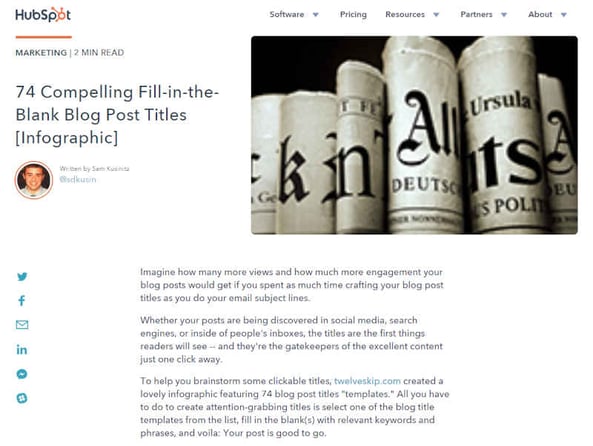
- 2. Salespeople must contribute to the content.
Marketers, if you want your salespeople to create content, don't ask them to blog: ask them to talk. And just sit there when they call. That talk is a great blog article or, actually, your next 10 or 20 blog articles.
- 3. Insert a call to action on your website.
Once you attract people to your website, then those conversions become critically important. The average conversion of somebody who enters your website the first time is 2%, that means that 98% of the people who come need to understand what you do before buying.
Having calls to action to grab their attention is crucial. For example, you should insert a ‘25 minutes consultation with an expertise’ instead of a ‘Contact us’ page.
'Contact us' pages are dead, that's old school. Why? Because ‘Contact us' is about you and no one wants to contact you: they want you to help them.

(Photo Credit: Photo by Anika Huizinga on Unsplash)
- 4. Use chat-bots.
Chat-bots are the future of marketing.
In HubSpot, if marketing sends an email for rep – with his/her signature and photo on it –, then when a visitor cycles into the website he/she will see a chat-bot with the face of that rep. And if that rep/face converts a higher percentage than another one, they use him/her more often.
Nowadays chat-bots are essential to practice a great Inbound marketing and to transform leads into customers in the right moment they are ready to buy.
- 5. Start a relationship with your customers.
Your website has to be your best salesperson. The good news is you don't have to pay it, but you have to feed it because it never sleeps.
Your website has to be the central opportunity for those conversions. Once people drop their contact information, you have an opportunity to nurture the relationship. It’s called 'Close' step, but it should be better ‘Starting the relationship’. In the old days we closed the deal, then you never see the salesperson after that, today you start a relationship.
- 6. Satisfy your customers.
Now that people have all the control of their buyer’s journey, what happens if they are unsatisfied customers? They usually go on Social Media or on reviews websites and write a complaint.
For example: 'I'm never doing business with that guy again, both personally as well as professionally'.
So satisfying your clients is more important than ever before.

- 7. Upsell current customers.
That’s the secret to selling more nowadays, we call it client engagement. In today's world, all businesses are at risk, but you should cocoon your existent customers to grow.
Everybody has great relationships with good fit customers indeed and that is your key competitive advantage against the best transactional companies in the world (against Amazon as well!).
Smaller businesses are really good at understanding their clients, so they can do more human Inbound marketing. Personal relationships are the keystone for upselling, satisfying and delighting your customers.
- 8. Pick a particular niche.
It sounds like an arduous stuff, doesn’t it? Don’t worry.
The world has changed: salespeople use to sell to everybody in the past years, but now you must adopt another strategy if you want to succeed.
You need to target a very specific demographic and persona if you want your leads and customers think: 'Oh my goodness, this is a person who understands who I am!'
"The riches are in the niches".
(Dan Tyre)
Resources
1. https://blog.whitehat-seo.co.uk/tips-for-a-successful-inbound-strategy-in-2018
2. https://blog.whitehat-seo.co.uk/how-build-a-qualified-lead
3. https://blog.whitehat-seo.co.uk/inbound-marketing-strategy-2018-tips
How to run a successful business in 2018 (and avoid a fatal error)
The magic word for succeeding is Inbound.
Treating people with a human approach makes it easier to help them, and the way to win in 2018 is to help people. It's selling + helping = shelping.
In the past, salespeople use to have 1 simple aim: selling as much as possible. Now it can’t be possible anymore, because prospects and clients want to be cuddled and want to start a relationship with the society they have chosen.
How can sales do that?
It is very simple: forgetting cold calling and embracing warm calling instead.

(Photo Credit: Pexels)
In the old days, sales reps didn't have a choice: taking the yellow pages and making cold calls was the only way to engage buyers. Today is different, today you have a choice. A cold call is a fatal error to avoid indeed, for 3 data-driven reasons, shown in a 2016 statistic led by The Bridge Group:
- Cold calling conversions are about 1.6%/2% out of the total.
- Warm calling (aka Inbound calling) conversions are between 9%/11%.
- So if you still cold call, you’re wasting the 98% of your time, effort and money.
But why cold calling is an outdated procedure in 2018? For 3 motivations:
- People don't pick up their phone when it rings.
- Cold calling is not doing your brand any favours.
- People feel that is not the right way to sell. If you treat them like total strangers, if you would never talk to them face to face and instead you send spam emails or you call and talk only about you, people not only aren’t going to listen: they are going to be offended.
It’s time to stop doing this. Sales organization can engage in a very professional, respectful and more effective way.
Resources
1. https://blog.whitehat-seo.co.uk/3-great-inbound-marketing-and-networking-tips-for-introverts
The magic strategy to beat competitors: ‘Smarketing’
In 2018, if you want to beat your competitors, you should start doing something very different out of what you usually do: ‘smarketing’.
What is ‘smarketing’?
Dan Tyre (Hubspot Sales Director) and Mike Volpi (former HubSpot CMO) invented that term in 2007 after the Inbound strategy had given them tons of SQL (Sales Qualified Lead), gaining new customer exponentially.
"From a sales perspective, Inbound leads change everything".
(Dan Tyre)
So, what does ‘smarketing’ mean?
“It’s not sales, it's not marketing, it's smarketing. It's all mixed together. Unless you're practising this alignment, you can't grow the way you should.”
(Dan Tyre)
- Marketing and Sales: 2 Opposite Worlds That Must Become 1
Sales and marketing historically have been so different.
Salespeople have a male character: a dominating one. Salespeople want to kill the competition, to crush everybody, to close a deal in every possible way.
On the other hand, marketing people have a female character: they just want to help. Marketing created the brand reputation, sales created leads. In the old days, salespeople did 95% of the work in creating new prospects and clients (so they got 90-95% of the glory and the budget), marketing people only 5%.
But in 2007 something changed: it was the year of the Inbound revolution.
Once again, marketing and sales reacted differently: marketers loved Inbound, they didn’t want to flog people and to send spam anymore. Salespeople were a little bit more suspicious.
- What Is Marketing Now?
In the Inbound era, marketing people have different tasks and responsibilities:
- Sending out emails for salespeople
- Booking meetings for reps
- Building email templates for reps
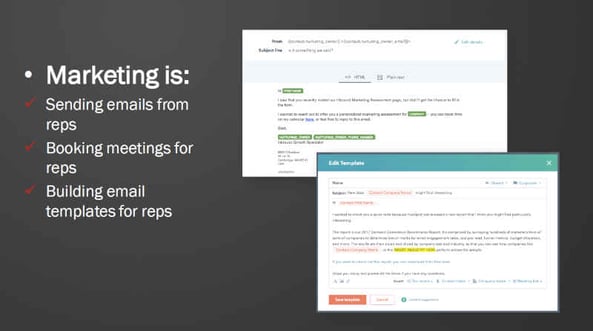
- What Is Sales Now?
Salespeople are:
- Doing persona research. Personas is a relatively new term, it used to be demographics years ago. In the old days, you look at everybody the same, you looked into categories. Now we're smart enough to realize that it's really about the emotional attachment and the trust that you build with prospects. Salespeople need to understand the buyer personas.
- Educating prospects. You have to be helpful (remember the ‘shelping’ idea?). What salespeople do is actually educate people just like marketing did.
- Sending content to nurture prospect.
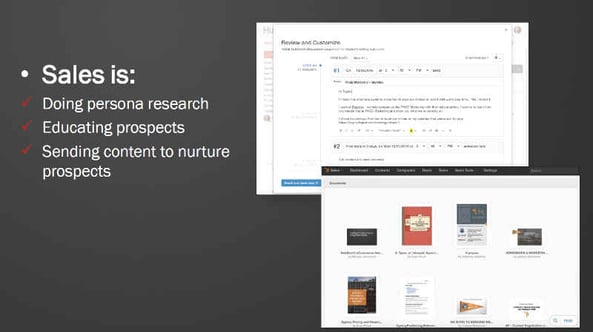
Different researches made by Aberdeen, Gartner and HubSpot shows that companies that align marketing and sales grow 20% more quickly.
“Every company wants to grow, but not everybody wants to change.”
(Todd Hockenberry)
Resources
1. https://blog.whitehat-seo.co.uk/inbound-marketing-delight-smart-text
8 tricks to be a perfect sales representative
In the old days, a smart and effective sales reps use to have 2 characteristics:
- Knowing everything about the product or service he/she was selling.
- Trying to call and interact with everybody, stopping the relationship after the sale.
If it’s still crucial to know every detail about your product or service, nowadays the way you reach people (and what kind of people you interact with) is completely different.
So how to be a perfect salesperson in the Inbound era? I’ll show you 8 ways to succeed, step by step.
- 1. Call 4 times and send video emails.
In 2018 salespeople have to call a prospect or send an email 4 times if they want to gain their attention – you'll never get a client on the first email. And the 3rd message should be a video.
Why? Because a HubSpot research shows that the conversion rate for a video email is between 24% and 30%.
In some industries you have to call 6 times, sometimes you have to email 6 times, but the HubSpot research study says that after 4 times and 4 emails you get over 50% of the responses.
There are different platforms you can use to send a video email (i.e. Soapbox, Vidyard or Loom). Just try them and choose the one that fits for you.

(Photo Credit: Donald Tong from Pexels)
- 2. Be human when you pick up the phone.
A good habit for the salespeople is to say 2 simple things on the phone:
- 'How are you doing today?'
- 'Can I ask what you were looking for help with?' That is a very human thing. Rarely will people decline that out.
- 3. Let’s feel the lead in control.
For example, when a guy contacts you saying: 'I'm just calling for educational information, I downloaded the eBook but I haven't read it yet. I'm just early in the process…’, your answer should be:
'Great. I'm here to help. What can I do to help? Can I explain to you what's in the eBook? Can I show you a little video? Do you want to follow up information? And when you're ready to move to the next step, I'm ready to be there. You have complete control’.
This process is successful, people want to hear something like: ‘I am interested in only helping you when you're ready. And I don't want to bother you other than that, because you're busy with life'.
This way people will feel you are going to assist them, not to just sell.

(Photo Credit: JESHOOTS.com from Pexels)
- 4. Avoid being sticky.
Yes, it’s true: you should call or send emails 4 times, but we don’t mean in 4 hours.
A good time schedule is this:
- You call or email now, then you wait 48 hours.
- You call or email again, then you wait other 48 or 36 hours.
- You make your third attempt (and it should be a video mail, remember?).
- Then you wait another 48 hours before trying the last time.
So you make 4 attempts in about 10 days.
Always being closing is dangerous as much as calling or sending an email just once.
Why?
Because this habit ignores buyer needs and places the salesperson at the centre of the sales process. You must never forget that your customers or prospects are the gold mine of your society, not you.
- 5. Make a discovery call.
The discovery call consists of asking questions about what your prospect really needs and then practising active listening (see point 6). For example, quiz he/her like this:
- ‘Are you going to buy in the next 30 days?’
- ‘Who besides yourself is the decision maker?’
- ‘Tell me where you are in the process now'.
- 'What can I do to help?' And the next stage: 'If you're interested, I can send you a product demo today'.

(Photo Credit: Valentin Antonucci from Pexels)
- 6. Activate listening skills.
In Dan Tyre’s opinion, this is the most important salesperson attribute in 2018. Listening skills are at the top of the list of importance.
So do you know who is the best salesperson ever? An introvert one. Can you believe it?
Indeed introverts typically have a natural aptitude towards listening, but anyone can become a good listener.
Give it some thought: how much does it cost to listen? How much product knowledge do you need to listen? What are the deep training programs that you need to go through so that you can listen?
Listening is super important because gives you an opportunity to figure out what your prospect wants.
You should:
- Not talking.
- Recapping what people are saying.

(Photo Credit: Pixabay)
- 7. Call or send an email in 5 minutes.
When you see that a prospect is opening your email or is reading the pricing page on your website (and you can do all this with lead notification and lead intelligence, as we are going to see a little bit later), you should contact him/her in 5 minutes, offering help.
What would happen if you wait 10 minutes? Probably the person would have forgotten your offer. It would be a pity.
- 8. Forget about scripts.
Years ago, salespeople started their careers memorizing by heart some scripts for their calls with clients. This is the past, now the world is spinning in a different way.
In 2018 a rep should read a sales playbook, that is a description of the persona, of what they want and of how a typical conversation would go. But nowadays no salesperson wants to be told exactly what to do. They want to be given a kind of idea of how they would use their own individuality and personality to get that point across.
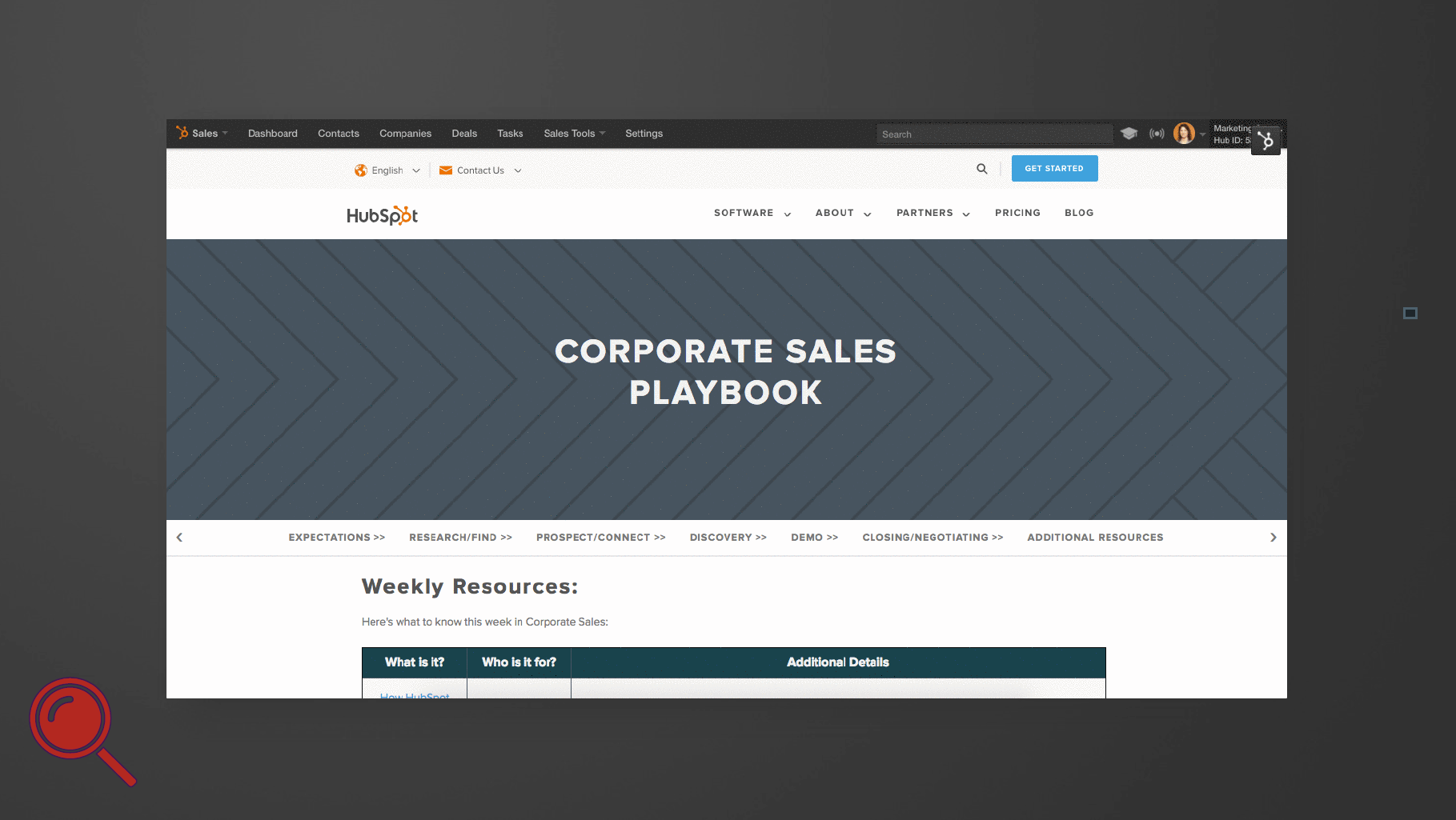
Resources
1. https://blog.whitehat-seo.co.uk/video-as-an-inbound-marketing-tool
2. https://blog.whitehat-seo.co.uk/how-video-marketing-affect-your-potential-customers-buying-decision
3. https://blog.whitehat-seo.co.uk/inbound-sales-methodology
How to align the marketing and sales teams
We are going to explain to you how to align marketing and sales team, step by step.
There are 6 fundamental procedures that you have to apply to your business.
- Setting goals.
- Service Level Agreements (SLA).
- Lead quality and handoff.
- Smarketing buy-in.
- Internal communication.
- Sales Enablement.
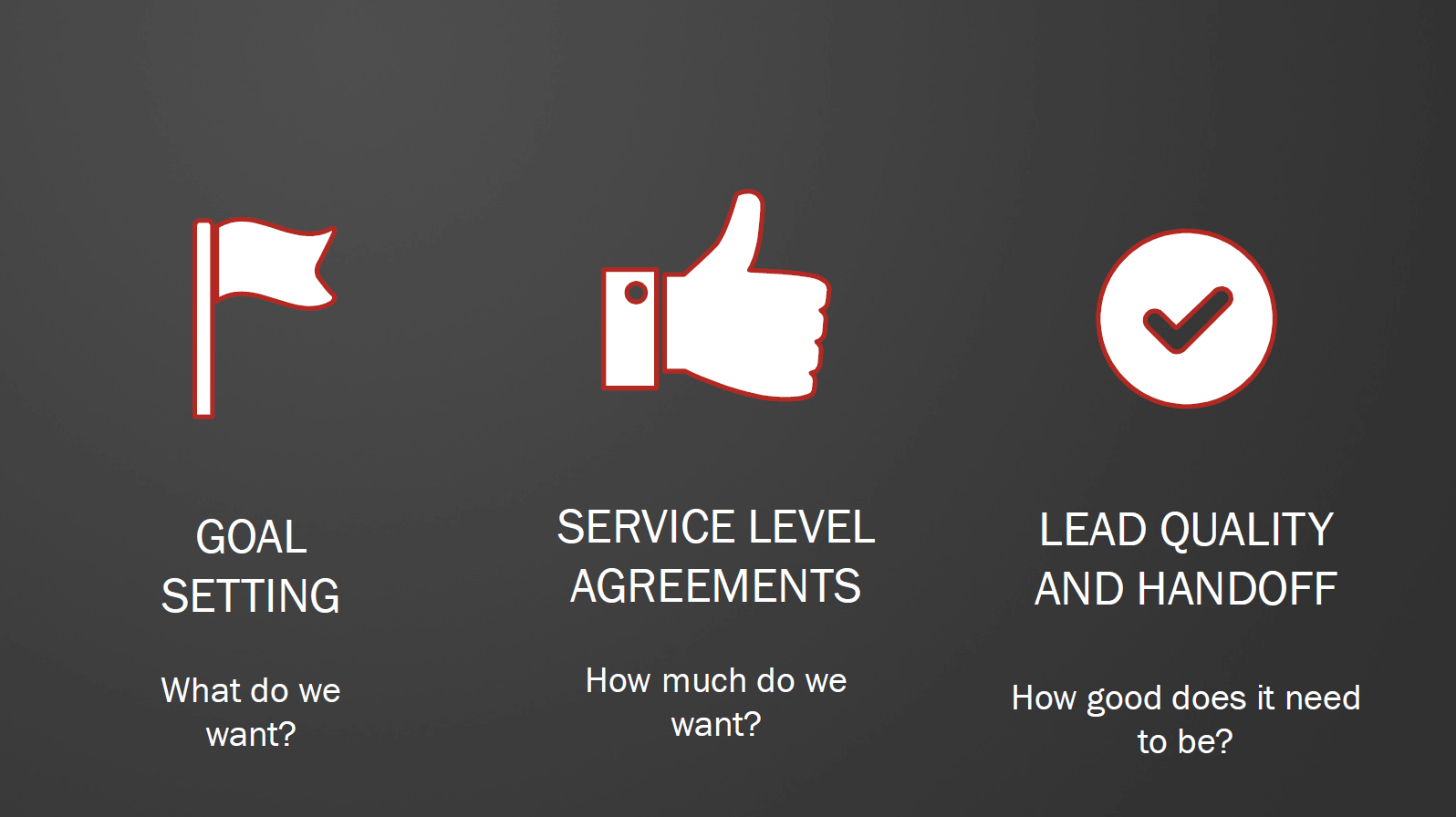
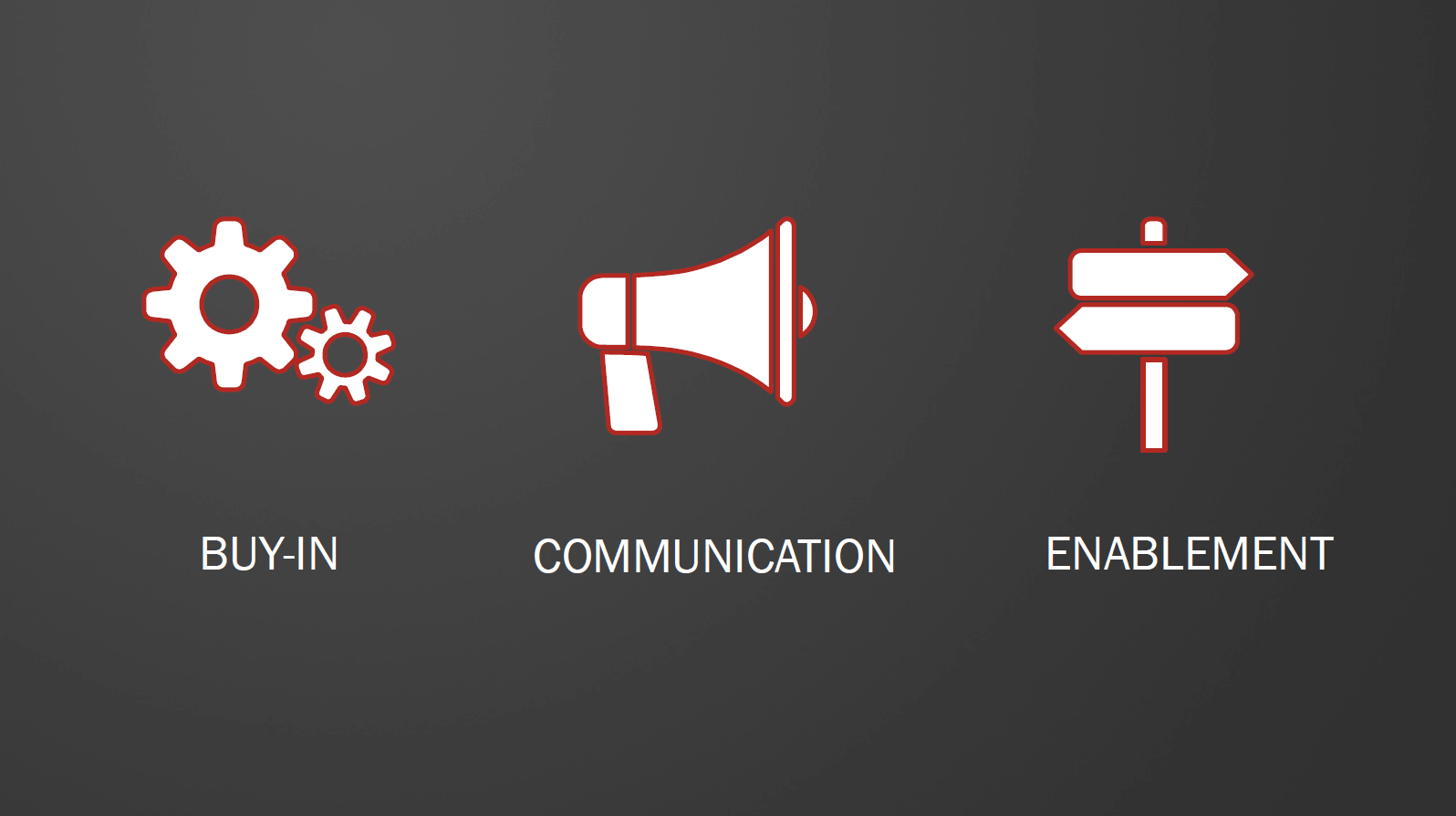
- 1. Set sales Goals.
First of all, you need to answer a question about your society: ‘What do we want?’.
HubSpot usually uses an M spot page to write down their goals. Each department of your company should have an M spot page and you should create them, starting with the company M spot, moved down to divisional M spots. This page shows you the mission, the strategy, the plays, the targets, and the omissions of your brand and departments.
An M spot page is like this:
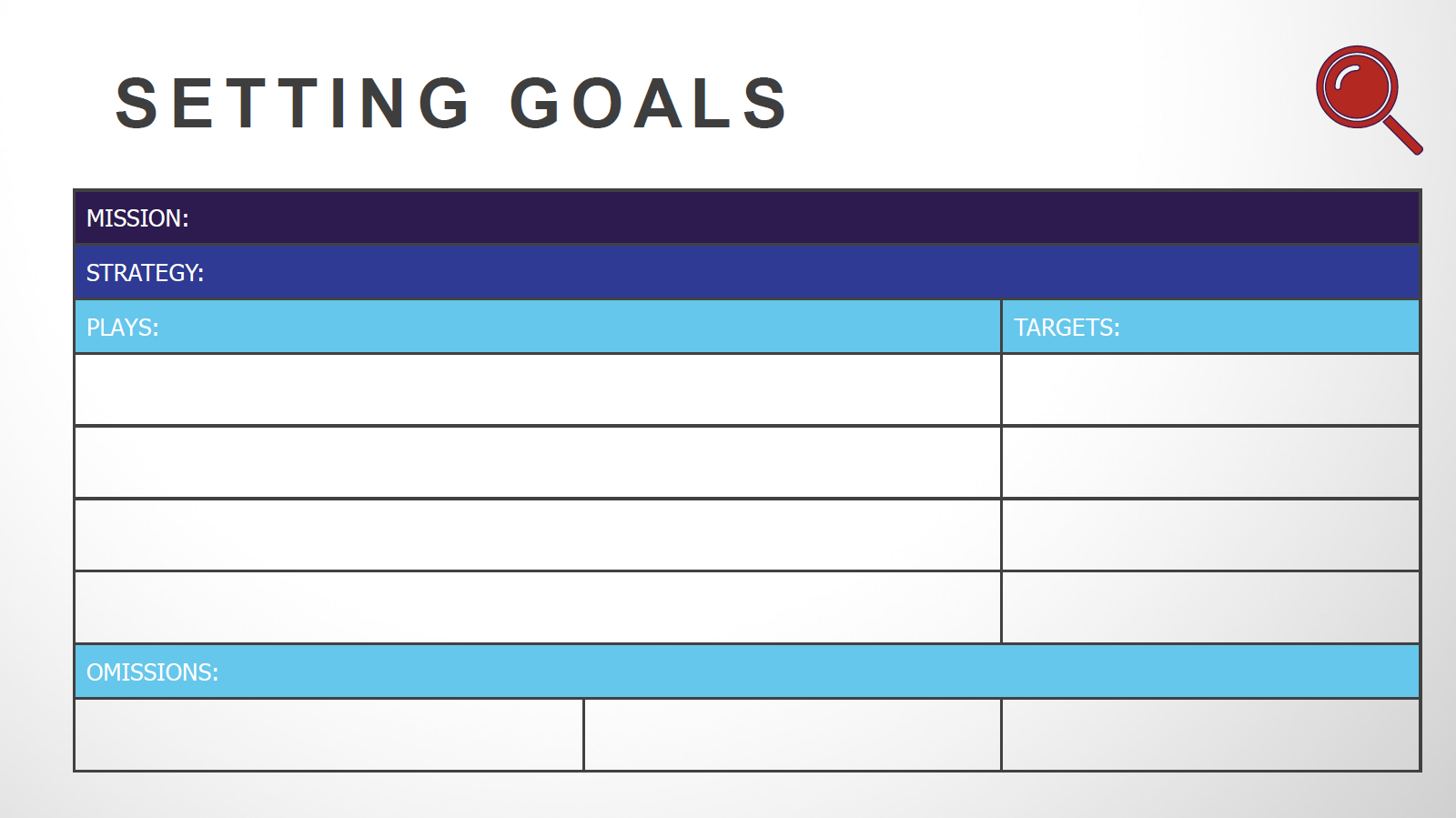
- The mission. In 2018 is critically important to understand what your company mission is. It's very important to define why you're doing it. It's not good enough to say: ‘Our mission is to grow’. You have to be very, very specific of what your mission is, so you can recruit the right people.
- The strategy. Your strategy is who you're going to service, and how.
- The plays. Your plays are the specific things that you're going to do in order to achieve your mission.
- The targets. Your targets are how you're going to be measured.
- The omissions. Your omissions are the things that you've considered that you're not going to do.
An example of how to fill out it:
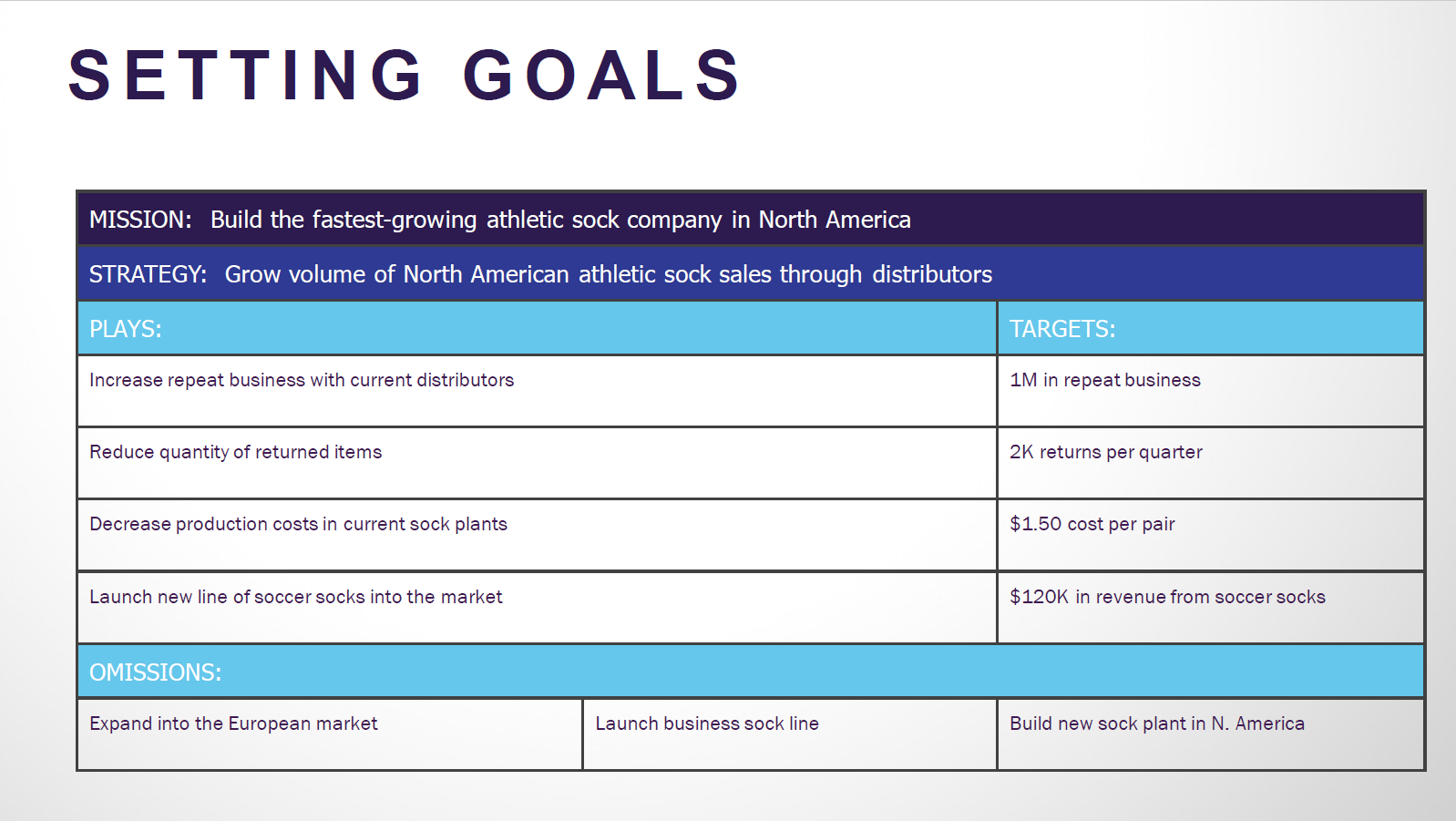
The goal setting has to be very specific about the type of company that you have. In the sales process, we call that ‘Identify and Connect’. Indeed you should:
- Identify the right good fit customers and then
- connect with them with effectiveness.
How can an M spot be used to align sales and marketing? It’s simple.
Let salespeople know and understand what marketing's goals are and vice versa.
- 2. Service level agreements (SLA).
The Service Level Agreement is what marketing is going to deliver for a pre-determined amount of demand. What marketing is going to deliver is an amount of MQLs (= Marketing Qualified Leads) and SQLs (Sales Qualified Leads).
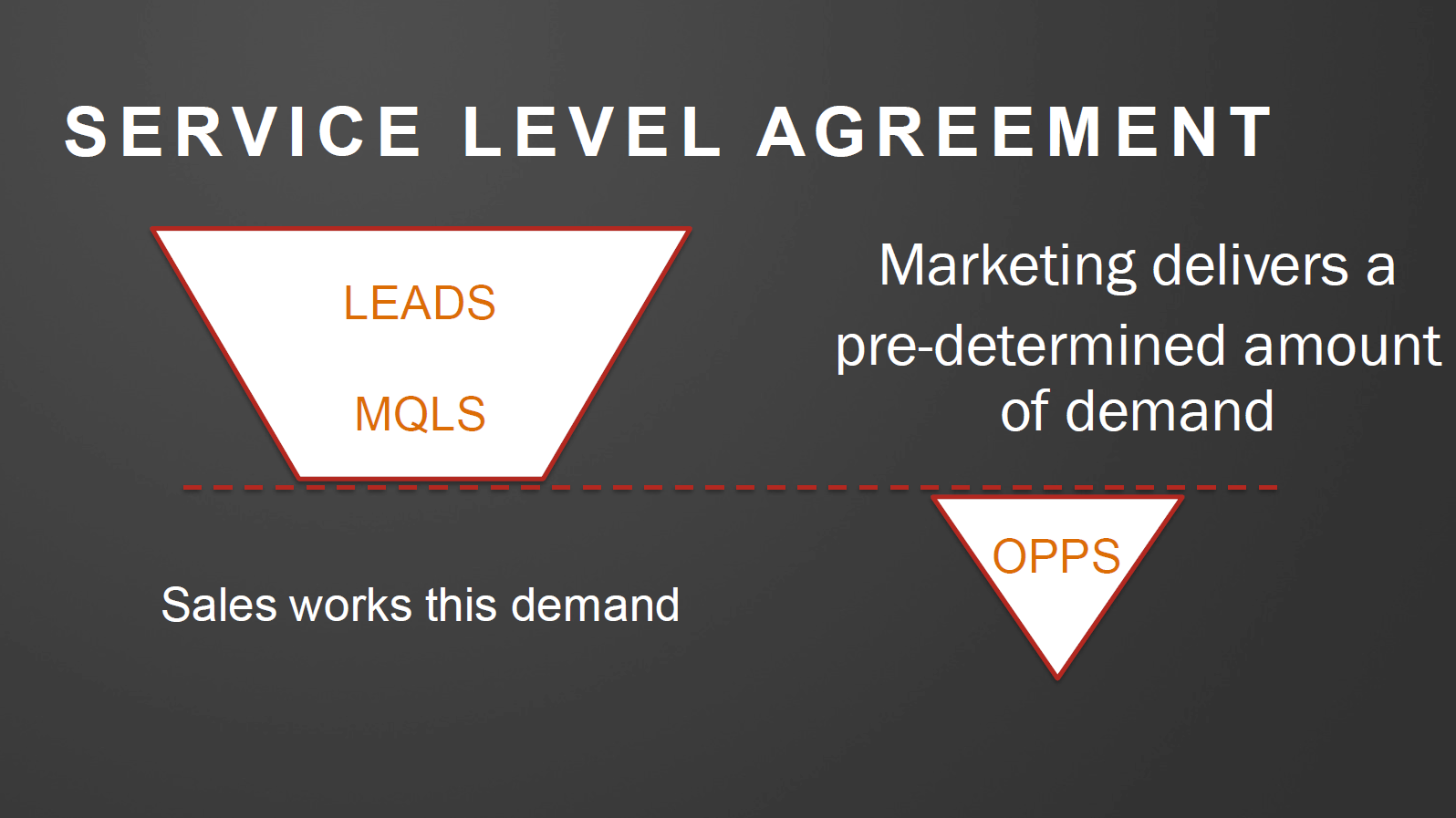
Typically, SQLs are going to be about 2% out of the total lead generation and MQLs are going to be 8%-12%.
Afterwards, sales reps must work this demand in a professional way (we’ve explained it before). The harder part is making sure salespeople follow up and call in the right metrics.
Why?
Because salespeople have to hit their quota to not being sacked, therefore they're less excited about calling a lead 4 times.
How to calculate a SLA between marketing and sales? Let’s find out the process, step by step.
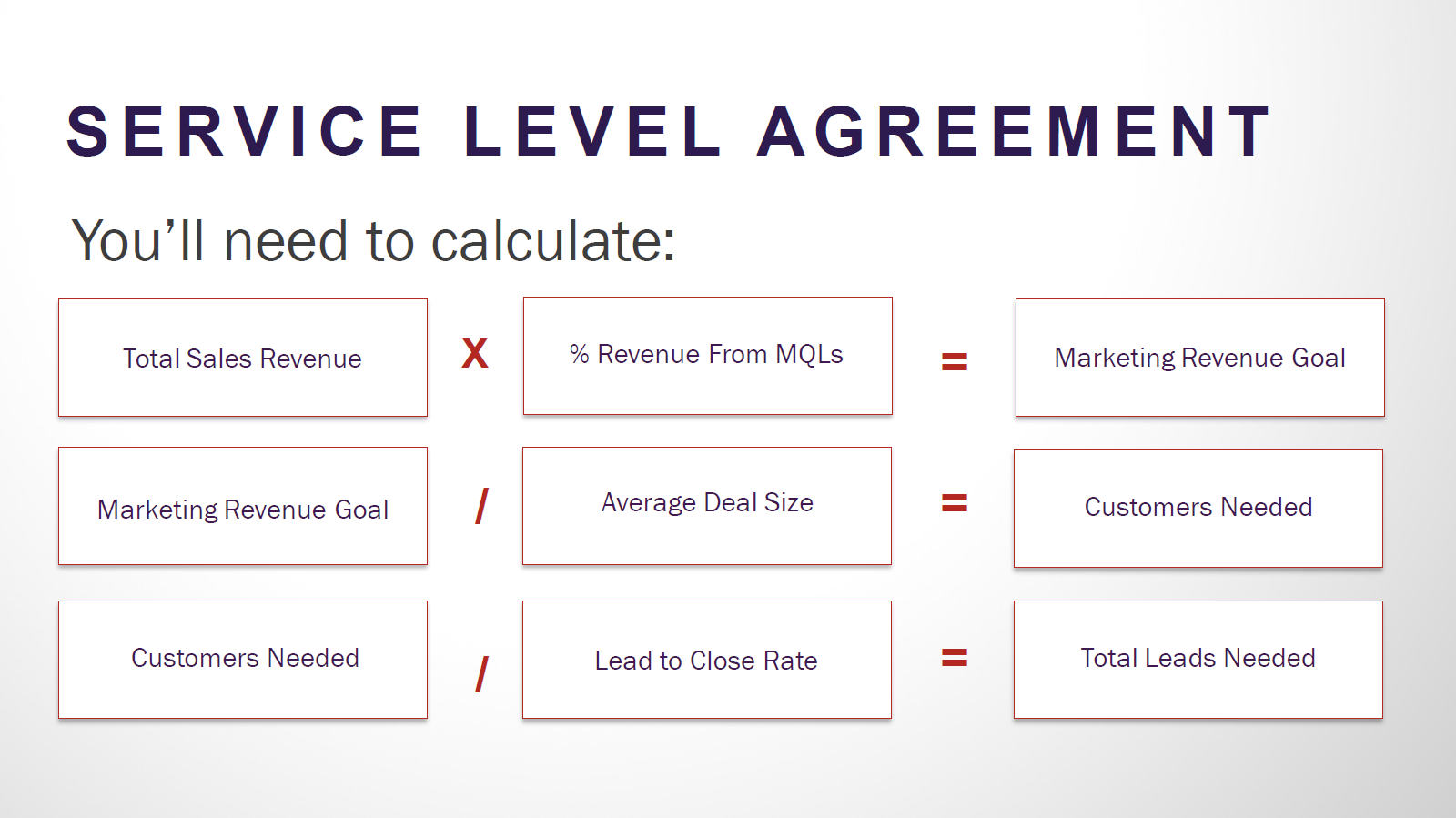
First of all, you need quota from the sales boss and from salespeople. Then you should figure out what your sales total goal is and how much new revenue you want to create from MQLs. This will be the Marketing Revenue Goal. You need also the average deal size and the lead to close rate.
This is an example of SLA:
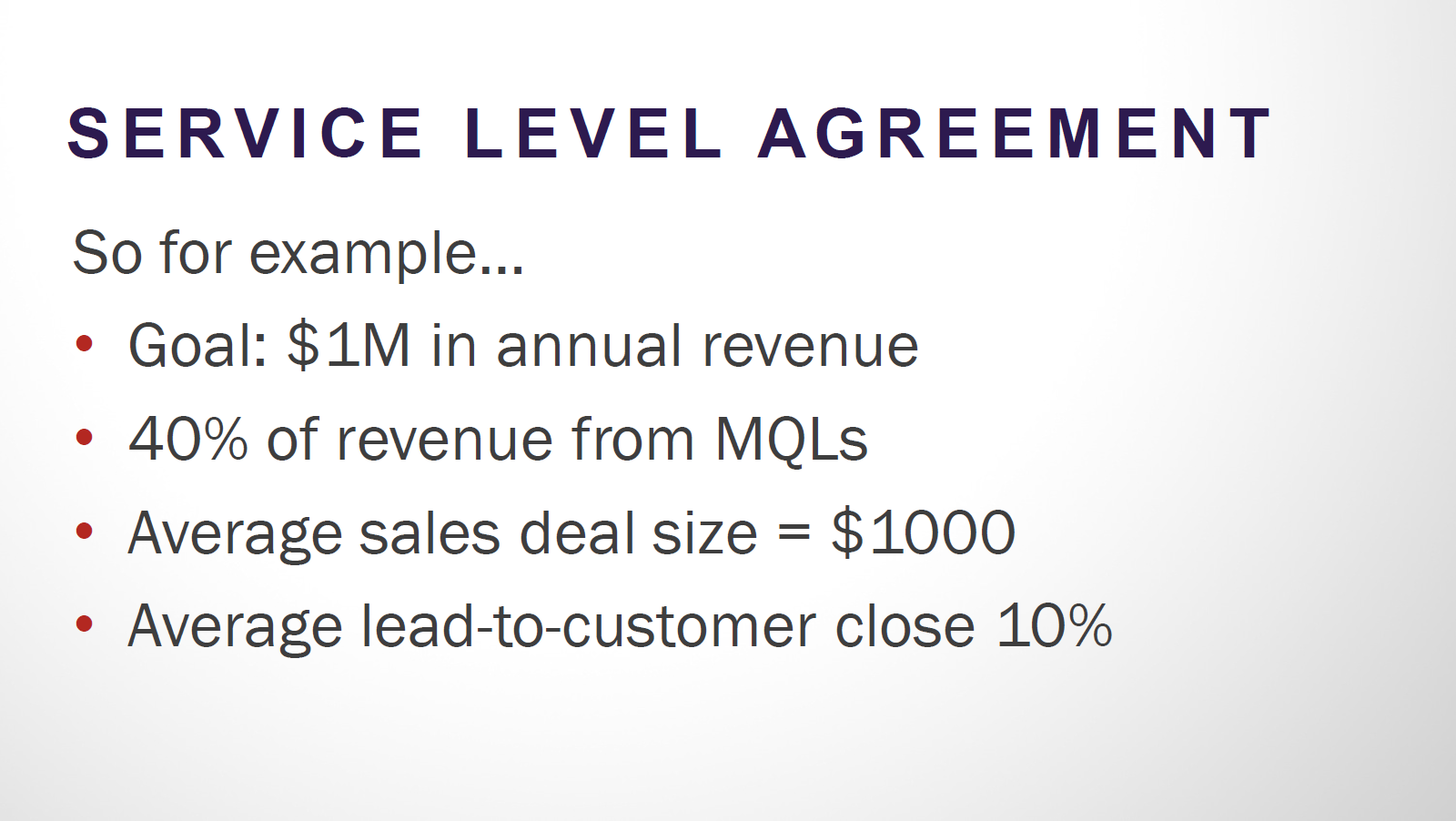
- 3. Lead quality and handoff.
To be successful is indispensable to give leads to the salespeople in the right moment.
It is not recommendable to pass a lead to a rep when he/she comes on your website for the first time, even if it could be fine if you need to increase the number of prospects.
A fundamental habit that sales reps should adopt is to follow up with leads in 5 minutes after they have visited your website. 10 minutes? It’s too late.
Why? Because after that time the percentage of closing decreases by 90%, according to a Kellogg’s study. That's why if you don't have lead notifications you will never sell anything.
“In the HubSpot world, we don't give leads to the sales department until they've come back to the website at least 3 times”.
(Dan Tyre)
But how can you determine if a lead is qualified?
With 2 criteria: fit and intent.
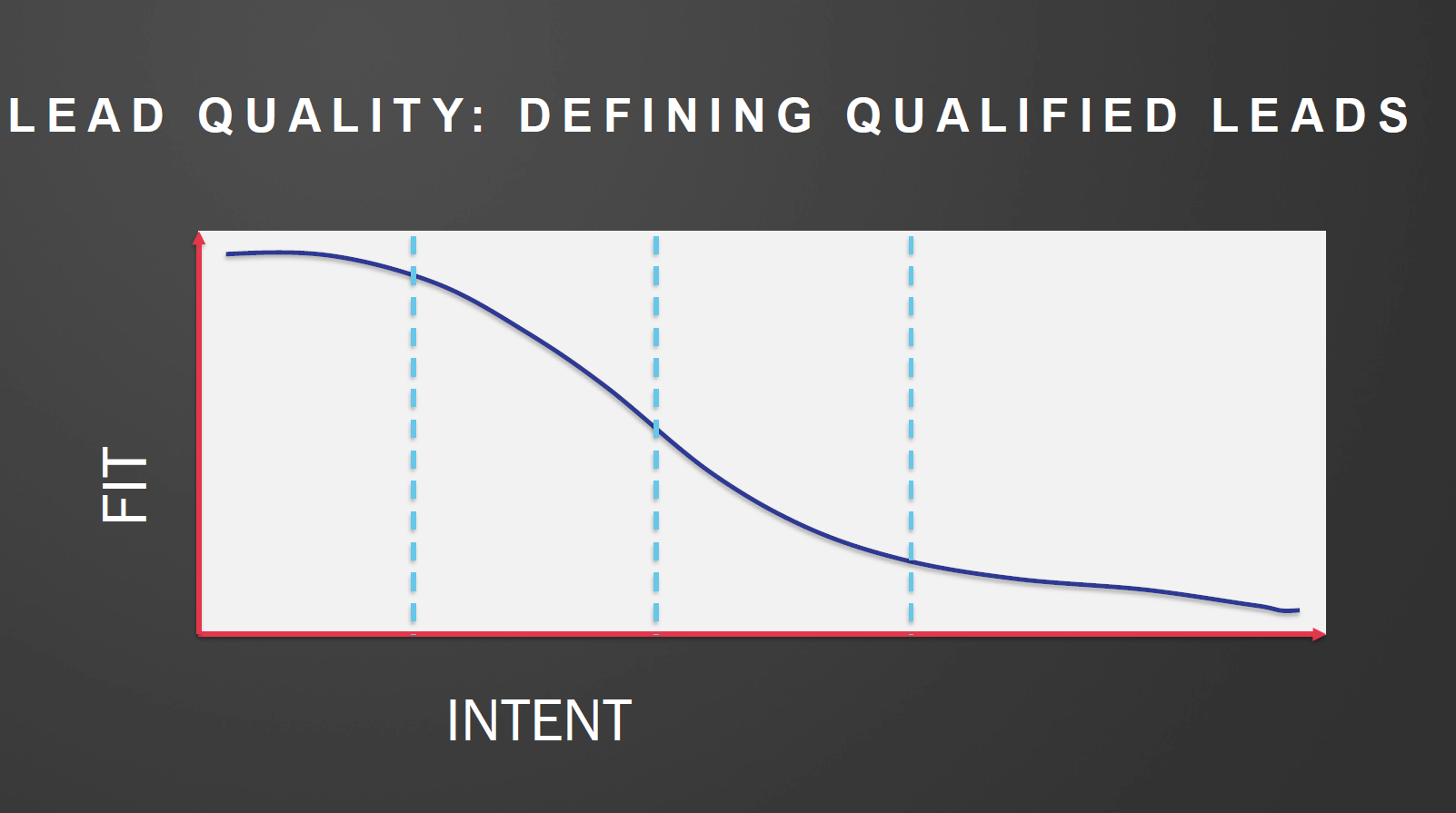
"Fit" is what page they go to on your website. So if you don't know which page people go to, you don't know if he/her is a good fit customer. And "intent" is what they mean by that page.
For sales and marketing alignment, the more information you give to a salesperson, the better.
HubSpot software tells salespeople which leads to call first, that is a huge advantage: so often reps are too much disorganized, they don't know what the priority is. HubSpot software will do that for them.
So the handoff is fundamental for your success and in order to have an excellent alignment between sales and marketing, it’s very important to find 3 agreements:
- Measure the funnel.
- Set expectations about who works what part of the funnel.
- Avoid overlap in communication.
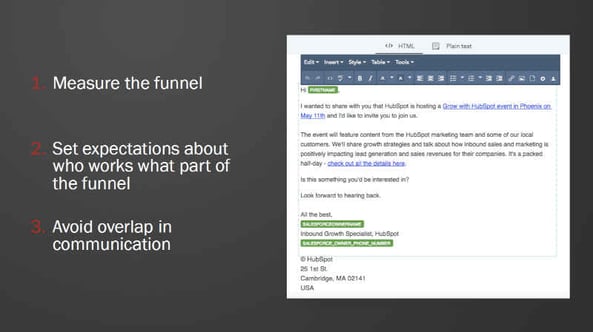
- 4. Smarketing buy-in.
Salespeople need to understand that marketers job is to help them close more deals. On the other hand, the crucial task of marketers is to figure out what reps quota is, how many deals they have to close (either every month, or every quarter, or every year).
Reps need to know what marketers expect of them and vice versa: if marketing delivers them leads, then marketers need a little help.
So to compile a buy-in for salespeople, marketers must know the individual goals of each of them.
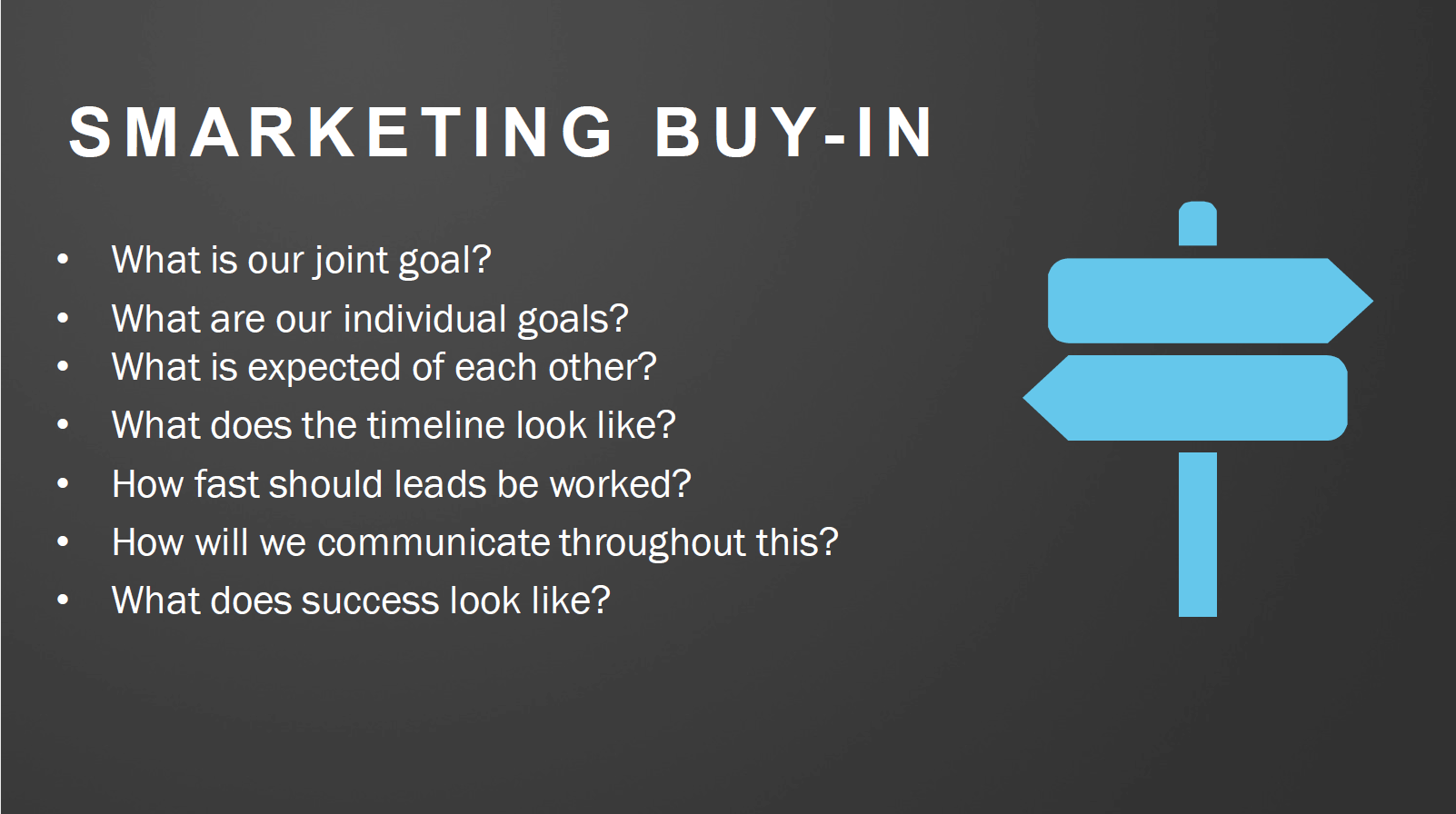
- 5. Internal communication.
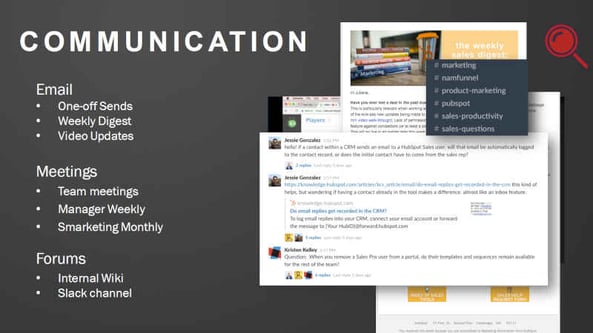
If there’s no communication inside your society, there is no possible success. Internal reports should have different shapes and media, like one-off-send emails, a weekly digest, video updates.
Internal meetings are also crucial and each department and degree of power should organize them regularly: you have to create that situation where people can speak openly about what's happening.
Last but not least, we strictly recommend to use a Wiki to post all the statistics of the company and let your staff know about it - part of being Inbound a is total transparency – and a chat channel like Slack: is a way of making sure that there's immediate communication inside the whole society.
- 6. Sales enablement.
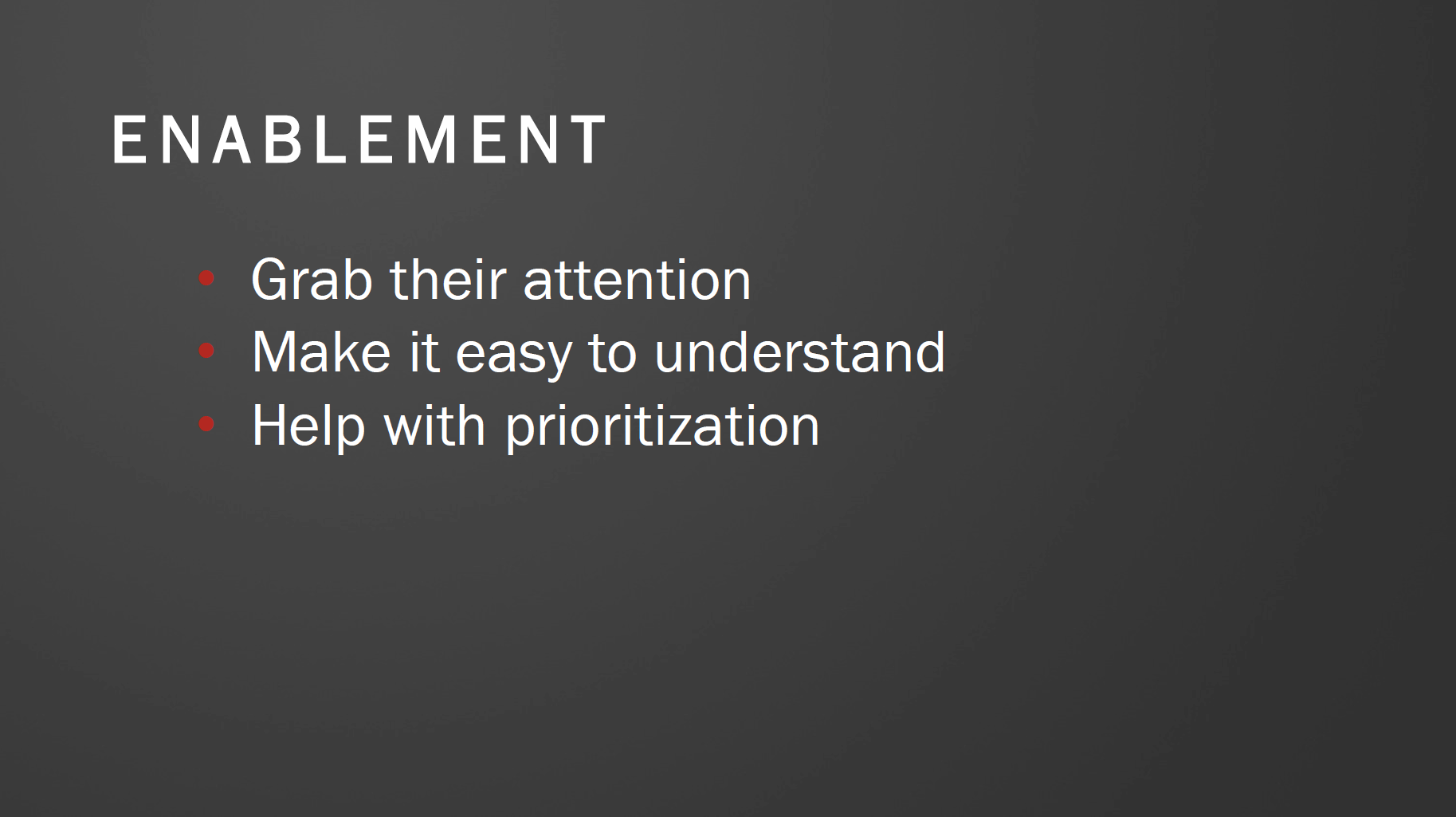
Your company should operate a salespeople enablement in order to get them the most powerful instruments. You can do it in 3 steps:
- Grab their attention. Salespeople are not process oriented, they're very focused on the here and now. Their attention span is like 2 or 3 seconds. So getting their attention is important.
- Make it easy to understand. You must feed them like a baby goat, and it's not that they're stupid (of course!), it's just they're thinking a lot of stuff. They're trying to do a lot of different things, so the easier you make it, the better.
- Help them with prioritization.
3 fundamental tools to enrich your strategy (and sell more)
We explained the importance of the cooperation between marketing and sales departments, but how can sales reps and marketers specifically work together?
There are 3 crucial tools you should get right into your CRM, in order to achieve a successful sales and marketing team alignment.
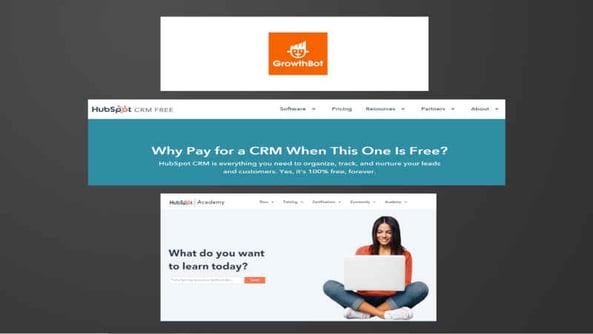
- 1. Lead intelligence.
If you want to close a deal in 2018, your marketers and salespeople must know exactly where a prospect is in his/her buyer’s journey and when the marketing department needs to stop nurturing him/her and passing the lead to the sales reps.
How to do this? With lead intelligence.
You need to know if that prospect lives in London or in Arkansas, how many times he/she has come back to your website, which pages of your website he/she has looked at, what he/she has avoided. You need to know if your lead opened that email, watched that video and how long.
Lead intelligence gives you power.
You can call your lead and say: 'Adrian, I see that you opened this email. I see you ignore this other one. It seems like you're at this part of the process and I can immediately tailor my approach to exactly what you want'.
That is a huge advantage, because:
- It is precisely what your prospect wants to hear.
- Only 2% of people in the UK handle lead intelligence, so you can beat your competitors easily.
HubSpot CRM has got lead intelligence to help companies grow.
- 2. Lead notification.
"If you don't have lead notifications, you cannot sell in 2018".
(Dan Tyre)
When someone is surfing your website or is opening the email you have sent to him/her, you need to know it, because it’s when you can act more efficiently.For example, if a prospect is looking at the pricing page and you receive a lead notification about it, you are able to call him/her in 5 minutes.
And maybe the answer will be: 'Oh my God! It is a little creepy, but yes, I'm on your pricing page and I have this question'.
If you don't have that information, how are you going to sell? It's just like putting duct tape over your mouth. You mustn’t talk to a prospect unless he/she is interested in talking to you. Otherwise, all you’ll do is annoying.
- 3. Meeting tools.
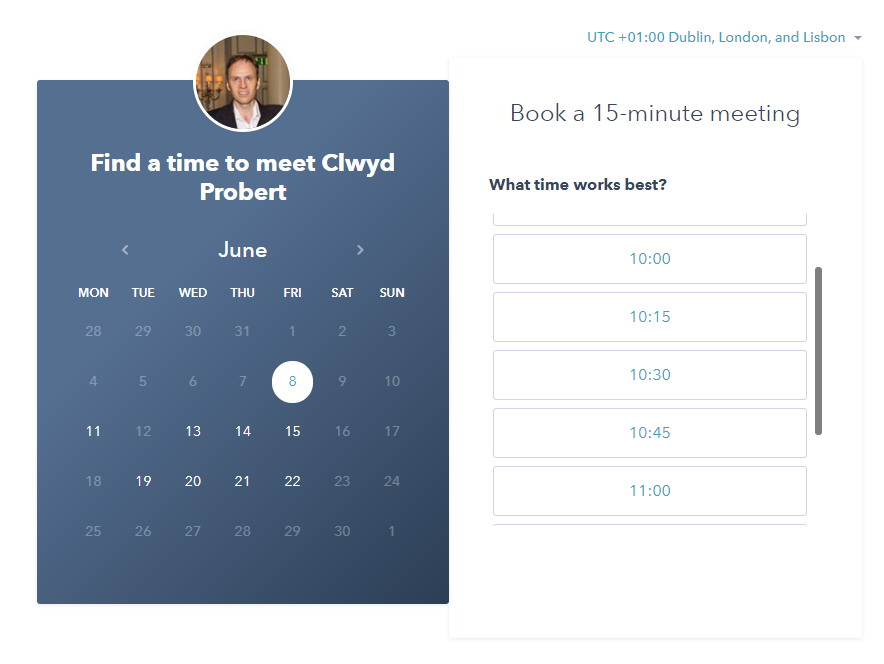 Time is money and you should do everything to save it. A revolutionary way to make an appointment without sending tons of emails around is to use a meeting tool.
Time is money and you should do everything to save it. A revolutionary way to make an appointment without sending tons of emails around is to use a meeting tool.
How does it work? Let’s see.
You just have to send this meeting tool to your prospects and it allows other people to pick the time that you are available. And it not only shows your available times: if your lead needs an appointment for multiple people, it displays the available time for them.
This tool is essential for a variety of reasons:
- It gives control to your prospects, it gives them the ability to set the time they want to meet with you.
- They will hardly miss the appointment they set by their selves.
- They can see your face in the meeting tool before they will come to your office. That makes them feel the humanness in a time schedule as well.
Resources
1. https://blog.whitehat-seo.co.uk/inbound-marketing-close-crm
The HubSpot growth playbook
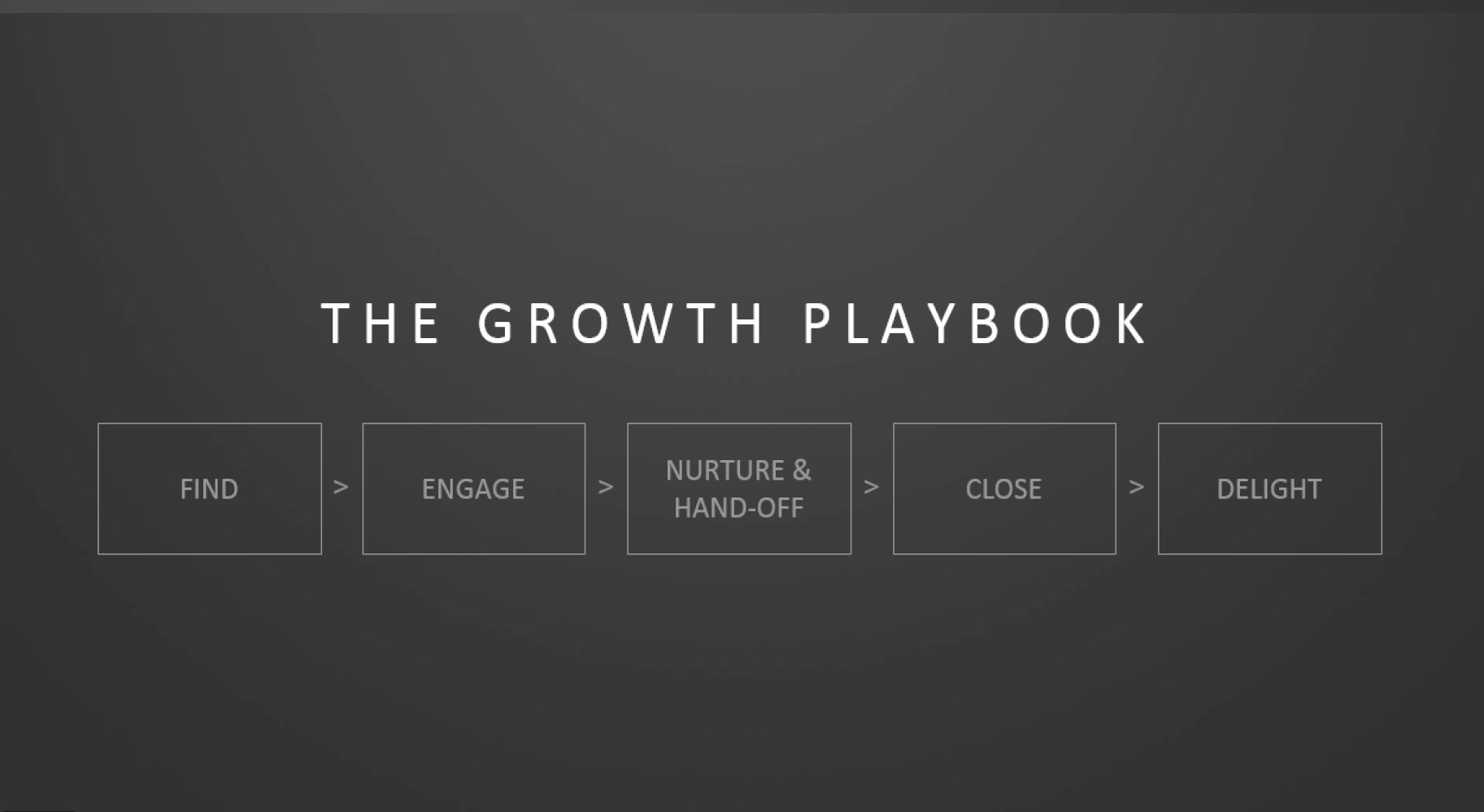
HubSpot world allows you to put into practice the best Inbound strategies and to create a perfect alignment for sales and marketing departments.
Specifically, the HubSpot platform gives you 6 products to win the game.
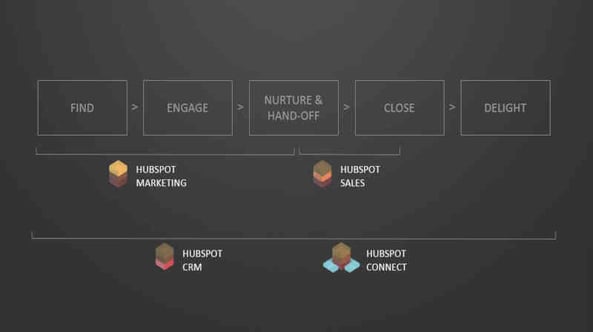
- HubSpot Marketing.
- HubSpot Sales.
- HubSpot CRM.
- HubSpot Connect.
- HubSpot Service Hub.
- HubSpot Academy (84 hours of lessons, 16 certifications).
Furthermore, HubSpot marketing and sales experts published 4 books to help you understand the power of Inbound.
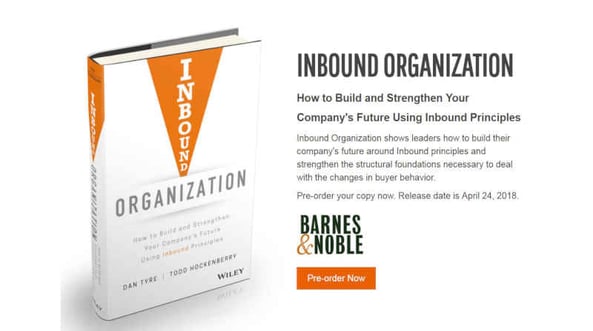
Dan Tyre and Todd Hockenberry, The Inbound Organization.
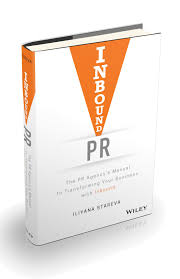 Illyana Stareva, Inbound PR.
Illyana Stareva, Inbound PR.
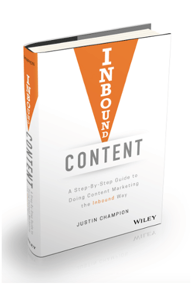
Justin Champion, Inbound Content.
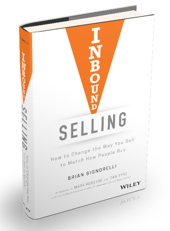 Brian Signorelli, Inbound Selling.
Brian Signorelli, Inbound Selling.
Resources
1. https://blog.whitehat-seo.co.uk/what-will-happen-to-hubspot
Conclusion
Now that you know how the market world is changed and how to sell in a more efficient way, your next steps should be to:
1. Aligning sales, marketing and company goals. Marketers need to know what your company goals are and what is the amount of quota you're going to take. Say to your employees:- ‘This is how many leads, MQL, SQLS we're going to create’.
- ‘This is how many times you were going to call, so that will create:
- this number of conversations,
- this number of opportunities,
- this number of proposals,
- this number of customers,
- this amount of revenue’.
2. Defining responsibilities across the funnel.
3. Communicating like a marketer internally to your organization.
Does it sound hard? Maybe, but it's definitely worth the risk.
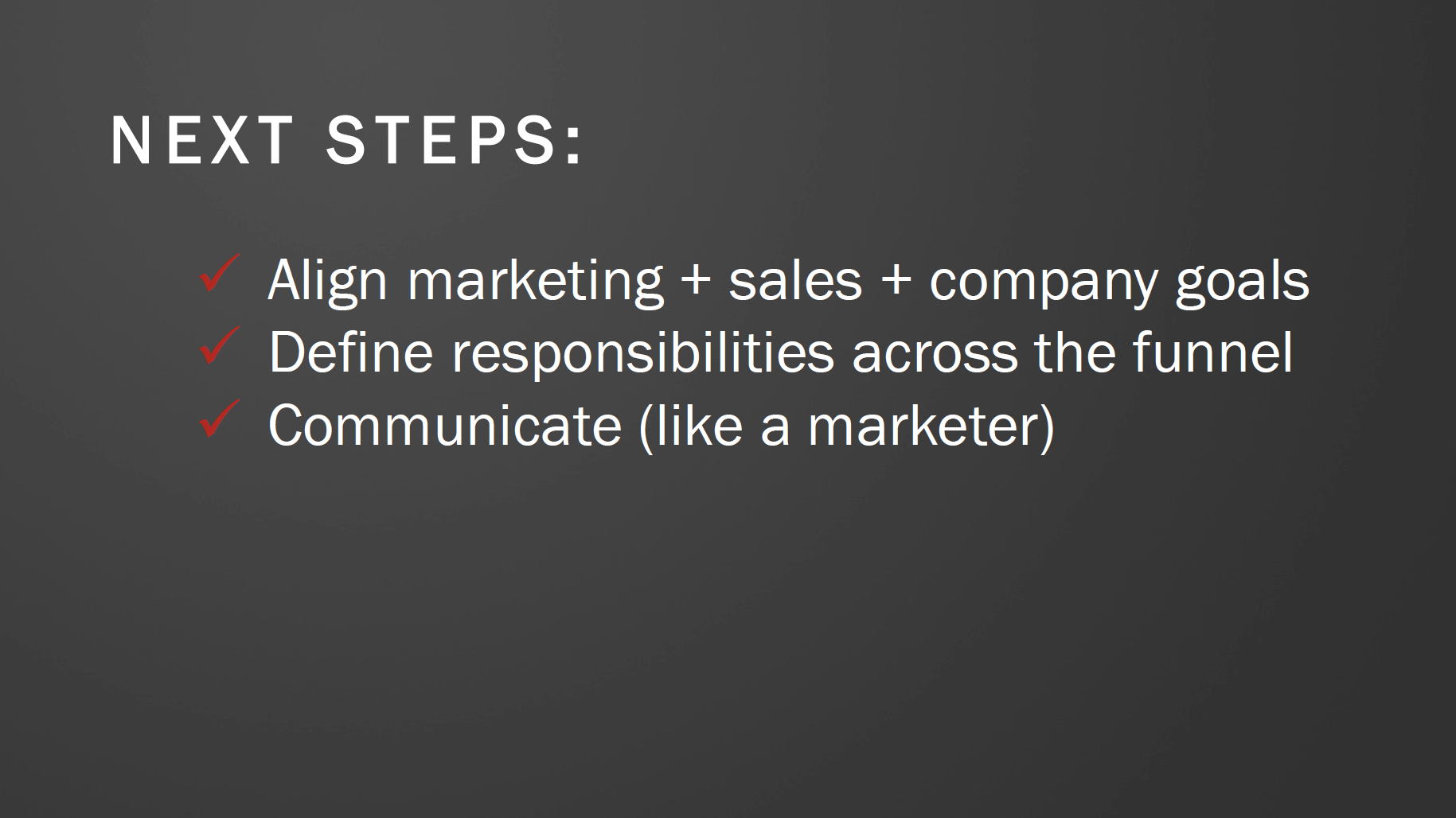
Recommended actions
1. Read our eBook How To Align Sales and Marketing Teams (and Create a Revenue Engine)
2. Read our eBook How To Build A Better Qualified Lead (And Win The Game At The Mid-Funnel).
Related Articles
1. London HUG - Inbound Marketing Strategy: How to Align Sales and Marketing Teams (Transcript and video)
2. London HUG - The world is changing. What will happen to HubSpot? (Transcript and video)
3. London HUG - Inbound marketing strategy: How to build a better qualified lead (Transcript and video)


